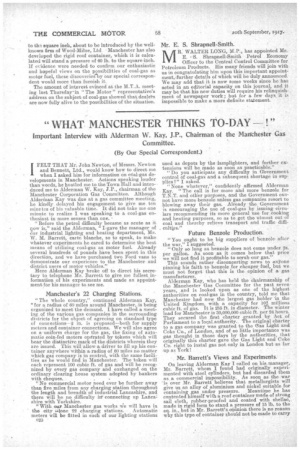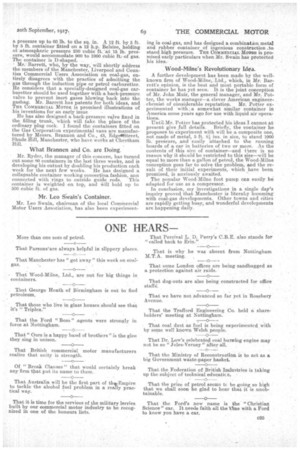"WHAT MANCHESTER THINKS TO-DAY
Page 2

Page 3

If you've noticed an error in this article please click here to report it so we can fix it.
Important Interview with Alderman W. Kay, J.P., Chairman of the Manchester Gas
Committee.
(By Our Special Correspondent.)
IFELT THAT Mr. John Newton, of Messrs. Newton and Bennett, Ltd., would know how to direct me when I asked him for information on ceal-gas developments in Manchester. Actions speaking louder than words, he hustled me to the Town Hall and introduced me to Alderman W. Kay, J.P., chairman of the Manchester Corporation Gas Committee. Although AlderMan Kay was due at a gas committee meeting, he kindly delayed his engagement to give me. ten minutes of his valuable time. It did not take me one minute to realize I was speaking to a coal-gas enthusiast in more senses than one. • "Before the petrol difficulty became as acute as it , now is "said the Alderman, "I-gave the manager of e . our industrial lighting and heating department, Mr. W. M. Barrett, carte blanche, so to speak, to make whatever experiments he cared to determine the best means of utilizing coal-gas as motor fuel. Already several hundreds of pounds have been spent in this direction, and we have purchased two Ford vans to demonstrate our experience to the Manchester and district users of motor vehicles." Here Alderman Kay broke off to direct his secretary to telephone Mr. Barrett to give me fullest information of his experiments and made an appointment for his manager to see me.
Manchester's 22 Charging Stations.
"The whole country," continued Alderman Kay, "for a radius of 60 miles around Manchester, is being organized te meet the demand. I have called a meeting of the various as companies in the surrounding districts for the obiect of agreeing on standard type of cons eetions-2 in. is proposed—both for supply meters and container connections. We will also agree on a uniform charge for the gas, the fixing of automatic coin-fed meters operated by tokens which will bear the distinctive mark of the districts wherein they are issued. This will allow a cliiver to fill up his container anywhere within a radius of 60 miles no matter which gae company is in control, with the same facilities as he would find in Manchester. The token will each represent 100 Cubic ft. of gas and will be recognized by every gas company and exchanged On the ordinary clearing house system adopted by bankers with cheques. . . "No commercial motor need ever be further away than five miles from any charging station throughout the length and breadth of industrial Lancashire, and there will be no difficulty ht connecting up Lance:: shire with Yorkshire. . . "With our Manchester gas works we will have in the city .:•lone 22 charging stations. Automatic meters will be fitted in each of our lighting stations 020 ' used as depots by the -lamplighters, and further extensions will be made as soon as practicable." "Do you anticipate any difficulty in Government control of coal-gas and a subsequent shortage in supplies ?" I asked. "None whatever," confidently affirmed Alderman Kay. "The call is for more and more benzoic for T.N.T. and other purposes, and the Government cannot have more -benzoic unless gas companies resort to blowing away their gas. Already the Government is encouraging the use of coal-gas by issuing circulars recommending its more general use for cooking and heating purposes, so as to get the utmost out of coal and thereby relieve transport and traffic diffi. culties."
Future Benzole Production.
"You ought to be big suppliers of benzoleafter the war," I suggested. "Only so long as benzole does not come under 2s. per gallon. As soon as it comes below that price we will not find it profitable to scrub our gas." This sounds rather disconcerting news to anyone pinning his faith to benzole for cheaper fuel, but we must not forget that this is the opinion of a gas manufacturer. Alderman Kay, who has held the chairmanship of the Manchester Gas Committee for the oast sevenyears, and is looked upon as one of the highest authorities on coal-gas in the country, told me that Manchester had now the largest gas holder in the United Kingdom, with a capacity for WImillions cubic ft. of gas. It is 285 ft. in diameter. The winter load for Manchester is 30,000,000 cubic ft. ner 24 hours. They secured the first charter granted by Act of Parliament to a local authority. The original charter to a gas company was granted to the as Light and Coke Co., of London, and of so little importance was gas thought in those days by the authorities, that originally this charter gave the Gas Light and Coke Co. right to instal gas not only in London but as far up as York!
Mr. Barrett's Views and Experiments.
On leaving Alderman Kay I called on his.rnanager, Mr. Barrett, whom I found had originally experimented with steel cylinders, but had discarded them ascommercial impossibility. As soon as the war is over Mr. Barrett believes that metallurgists will give ue_ an alloy of aluminium and nickel suitable for containing .gas under pressure. Meantime he has contented himself with a roof container made of strong sail cloth: rubber-proofed and coated with shellac, made in rigid form to stand a pressure of 15 lb. to the eq. in., but in Mr. Barrett's opinion there is no reason why this type of container ehould not be made to carry a pressure up to 60 lb. to the sq. in. A 12 ft. by 5 ft. by 5 ft. container fitted on a 12 h.p. Belsize, holding at .atmospheric pressure 230 cubic ft. at 15 lb. pressure, would accommodate 900 to 1000 cubic ft: of gas. The container is D-shaped. Mr. Barrett, who, by the way, will shortly address the members of the Manchester Liverpool and Counties Commercial Users Association on coal-gas, entirely disagrees with the practice of admitting the gas through the induction pipe or petrol carburetter. He considers that a specially-designed coal-gas carburetter should be used together with a back-pressure valve to prevent inert gases blowing back into the gasbag. Mr. Barrett has patents for both ideas, and THE COMMERCIAL MOTOR is promised illustrations of his inventions for an early issue He has also designed a back-pressure valve fixed in the filling trunk, which will take the place of the ordinary plug cock. I found the containers fitted on the Gas Corporation experimental vans are manufactured by Messrs. Brannen and Co., 43, EdgeeStreet, Shade Hill, Manchester, who have works at Cheetham Hill. •
What Brannen and Co. are Doing.
Mr. Ryder, the manager of this concern, has turned out some 80 containers in the last three weeks, and is developing his outout by doubling his production each week for the next few weeks. He has designed a collapsable container 'working concertina fashion, ma connected with rings to outside guide rods. This container is weighted on top, and will hold up to 500 cubic ft. of gas.
Mr. Leo Swain's Container.
Mr. Leo Swain, chairman of the local Commercial Motor Users Association, has also been experiment ing in coal-gas, and has designed a combination metal and rubber container of ingenious construction ,,to stand high pressure. THE COMMERCIAL MOTOR is promised early particulars when Mr. Swain has protected his idea.
Wood-Milne's Revolutionary Ida.
A further development has been made by the wellknown firm of Wood-Milne, .Ltd., which, in Mr. Barrett's opinion, is the best and Most portable form of container he has yet seen. It is the Joint conception of Mr. John Muir, the general manager, and Mr. Potter, the works manager—a. clever American engineerchemist of considerable reputation. Mr. Potter experimented with :a somewhat similar container in America some years ago for use with liquid air operations.
Until Mr. Potter has protected his ideas .I cannot at present give full details_ Briefly, the -container he proposes to experiment with will be a composite one not made of metal, 5 ft. WI ins, in size, to stand 1006 lb. pressure, and easily attached to the running boards of a, car in batteries of two or more. As the contents of this size of container--and tliere is no reason why it should be restricted to this size---will be equal to more than a gallon of petrol, the Wood-Milne conception goes far to solve the problem, and the result of their initial experiments, which have been promised, is anxiously awaited. The popular Wood-Milne foot pump can easily be adapted for use as a compressor. In conclusion, my investigations in a single day's inquiry proved, that Manchester is literal*, humming with coal-gas developments. Other towns and cities are rapidly getting busy, and Wonderful developments are happening daily.
























